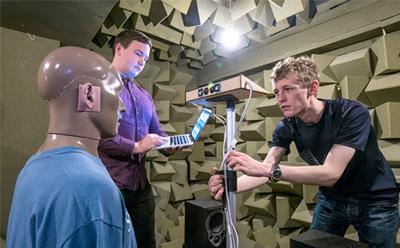Private sound zones within cars to be trialled in EPSRC Doctoral Prize

Postgraduate research student Daniel Wallace will test sound zones for private in-car phone calls in a new Doctoral Prize Fellowship at the University of Southampton.
The acoustical engineer will consider physical and psychoacoustic factors to focus sound toward listeners while also aiming extra background noise at potential eavesdroppers.
The research into Private Personal Sound Zones was chosen as the runner up and People’s Choice Winner at this summer’s Southampton Three Minute Thesis (3MT®) competition.
Daniel will advance the 12-month prize from the Engineering and Physical Sciences Research Council (EPSRC) within the University’s Institute of Sound and Vibration Research.
“Normal loudspeakers tend to fill the room with sound, but this isn't always beneficial when privacy is a concern,” Daniel says. “If you're using an intercom at a bank counter, you probably don't want everyone else nearby hearing how much money you have.
“The systems I'm researching use several speakers to focus sound towards you, and can focus extra background noise towards others, so that speech is loud and clear for you, and nobody else. We can tailor this background noise to be appropriate to different environments, to make sure it's not annoying or distracting, whilst still preserving your privacy.”
Daniel has developed a method for finding the type of background noise that preserves the privacy of the target listener, whilst also being acceptable to hear. He has also investigated how the performance of these types of systems is affected by reverberation and the normal variation of background noise in a space.
“The approach integrates some prior knowledge about the human perception of sound directly into the design, thereby hopefully avoiding solutions that are technically good but would sound subjectively dreadful,” Daniel explains.
“I’ve also restricted myself to looking at very simple systems that can be implemented cheaply, and don’t require a lot of space. I’d like to thank my supervisor Dr Jordan Cheer for supporting me throughout the project and for helping me with this Doctoral Prize proposal.”
During the EPSRC Fellowship, Daniel will define situations where people are comfortable or uncomfortable taking personal or business hands-free calls and run subjective experiments to see how private audio systems could help with the problem. Scenes will be projected using VR equipment to capture peoples’ responses and help build trust in the technology.